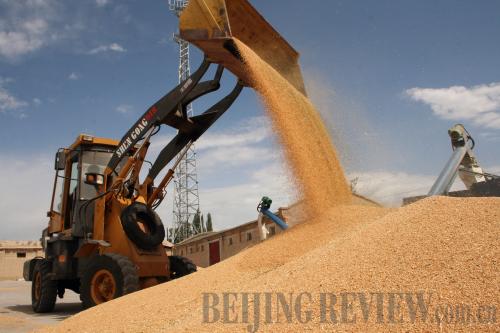|
 |
|
MODERN AGRICULTURE: A harvester collects wheat at the 84th Regiment of the Fifth Division of the XPCC (CFP) |
Lu Liping, a 55-year-old farmer living in the suburbs of Shihezi, northwest China's Xinjiang Uygur Autonomous Region, has been operating his family courtyard for more than 20 years. The family's annual net income stands at about 100,000 yuan ($16,350).
"My family's farming land is only 0.53 hectares, and as well as putting in more time, increasing the output and making the fruits more nutritious are crucial," said Lu.
In winter when no agricultural work can be done in the harsh open air, farmers are often given agricultural classes.
Today, dates, black peanuts, purple corn and purple potatoes, which are all natural and healthy foods loved by urban residents, have brought Lu a considerable income. Some of his crops are sold not only to Urumqi, capital city of the region, but also to big cities like Beijing and Shanghai. In September, he began to operate an agri-tourism venture in his courtyard, including the crop fields, which provides another source of income.
In mid 1990s, Lu's family's income was only 50,000 yuan ($8,170) a year and now it is 100,000 ($16,350). "I hope through our efforts, we can reach 150,000 ($23,800) in the near future."
Lu's life is not uncommon in the Xinjiang Production and Construction Corps (XPCC).
In October 1954, a special social organization that integrated the Party, the military, the government and enterprises, was set up in Xinjiang to develop frontier regions and consolidate border defense.
In the immediate aftermath of the foundation of the People's Republic of China in 1949, separatists in Xinjiang colluded with foreign forces in frequently instigating riots, which seriously shook the stability of the region. Against this background, the newly founded Central Government made a decision to establish the XPCC. In 1954, an army group led by General Wang Zhen (1908-93) was separated from the national defense forces, whose missions were to carry out both production and militia duties, and to develop and secure the border areas.
The decision was inspired by the traditional Chinese tuntian system—stationing garrison troops to cultivate and guard the area. The system was a legacy of China's several thousand years of history of developing and safeguarding its frontiers.
The XPCC has made strenuous efforts to fulfill the responsibilities the state has entrusted to it. In line with the principle of never competing for benefits with local inhabitants, the corps developed fertile land for the local people and marched into harsh terrains including the region's deserts.
Despite an unforgiving natural environment, the corps has reclaimed ecological oases from the desolate Gobi Desert; initiated Xinjiang's modernization; built large-scale agricultural, industrial and mining enterprises; and established new cities and towns. The corps has helped Xinjiang build a relatively comprehensive modern industrial system and served as a pioneer for the development of agriculture, business and transportation in the area.
Today, the XPCC is also devoted to developing new types of agriculture such as shelter forests and drip irrigation, while strengthening national solidarity and protecting border areas.
| 